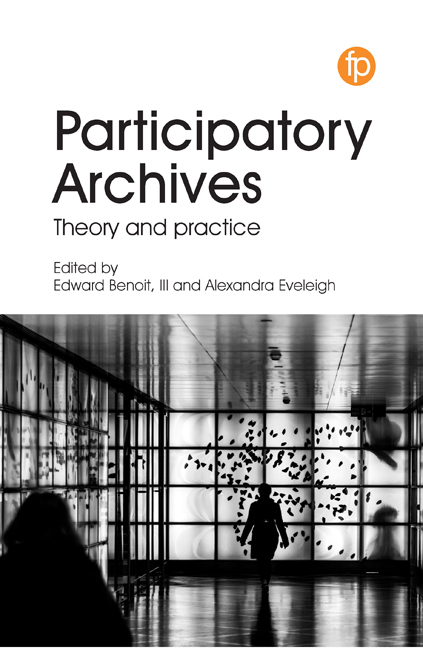Book contents
- Frontmatter
- Contents
- Figures and table
- Notes on contributors
- 1 Defining and framing participatory archives in archival science
- SECTION 1 SOCIAL TAGGING AND COMMENTING
- SECTION 2 TRANSCRIPTION
- SECTION 3 CROWDFUNDING AND OUTREACH
- SECTION 4 ALTERNATIVE AND ACTIVIST COMMUNITIES
- 14 Degrees of mediation: a review of the intersectionality between community and participatory archives
- 15 Activist participatory communities in archival contexts: theoretical perspectives
- 16 Documenting a social movement in real time: the Preserve the Baltimore Uprising 2015 archive project
- 17 Community partnerships and collection development in the Legacy of Ahmed Project
- 18 Challenges, opportunities and future directions of participatory archives
- Notes
- Index
17 - Community partnerships and collection development in the Legacy of Ahmed Project
from SECTION 4 - ALTERNATIVE AND ACTIVIST COMMUNITIES
Published online by Cambridge University Press: 25 October 2019
- Frontmatter
- Contents
- Figures and table
- Notes on contributors
- 1 Defining and framing participatory archives in archival science
- SECTION 1 SOCIAL TAGGING AND COMMENTING
- SECTION 2 TRANSCRIPTION
- SECTION 3 CROWDFUNDING AND OUTREACH
- SECTION 4 ALTERNATIVE AND ACTIVIST COMMUNITIES
- 14 Degrees of mediation: a review of the intersectionality between community and participatory archives
- 15 Activist participatory communities in archival contexts: theoretical perspectives
- 16 Documenting a social movement in real time: the Preserve the Baltimore Uprising 2015 archive project
- 17 Community partnerships and collection development in the Legacy of Ahmed Project
- 18 Challenges, opportunities and future directions of participatory archives
- Notes
- Index
Summary
The archive at the Ahmed Iqbal Ullah Race Relations Resource Centre is unusual within the sector. In addition to more traditional models of acquisition, we actively develop our collections through in-house projects and ongoing community partnerships, generating material that is accessioned into the collection. Our mission is to document, preserve and disseminate black, Asian and minority ethnic (BAME) experiences; it could not be realised without the meaningful participation of our local BAME communities.
The Legacy of Ahmed Project, which took place between 2015 and 2017, reveals the fluid, mutually beneficial but also ethically complex nature of community project partnerships, and the challenges that this way of working brings to collection management.
A cyclical approach to engagement and collecting
The Ahmed Iqbal Ullah Race Relations Resource Centre opened in 1999 as a small race studies library at the University of Manchester. Although initially based on campus, it launched as an open-access library, designed to support anti-racist education and community outreach in addition to academic research.
The Ahmed Iqbal Ullah Education Trust was established as an independent charity in 2001 to lead on our education and community work. Through the education trust we organise projects to uncover and record minority histories, developing resources and providing opportunities for students, academics, community groups and school children to learn about Manchester's multicultural heritage. The outputs of this work, which include oral history interviews, books, teaching packs, exhibitions, creative work and historic ephemera, are added to the resource centre's collections where they can form the basis of future research and outreach projects.
These two sides of our work – outreach and engagement through the education trust and collection management and access through the resource centre – have always had equal weight and have developed symbiotically into the organisation we are today. Our library and archive are now part of the University of Manchester Library's Special Collections, in recognition of the research value of our collections, but we are physically located at Manchester Central Library, the city's public library, reflecting our important community engagement role.
The Legacy of Ahmed Project
In 1986 Ahmed Iqbal Ullah, a 13-year-old Bangladeshi boy, was stabbed in the playground of his high school in Manchester, in what was later deemed a racially motivated attack. He died of his injuries.
Information
- Type
- Chapter
- Information
- Participatory Archives , pp. 203 - 210Publisher: FacetPrint publication year: 2019
Accessibility standard: Unknown
Why this information is here
This section outlines the accessibility features of this content - including support for screen readers, full keyboard navigation and high-contrast display options. This may not be relevant for you.Accessibility Information
- 1
- Cited by
